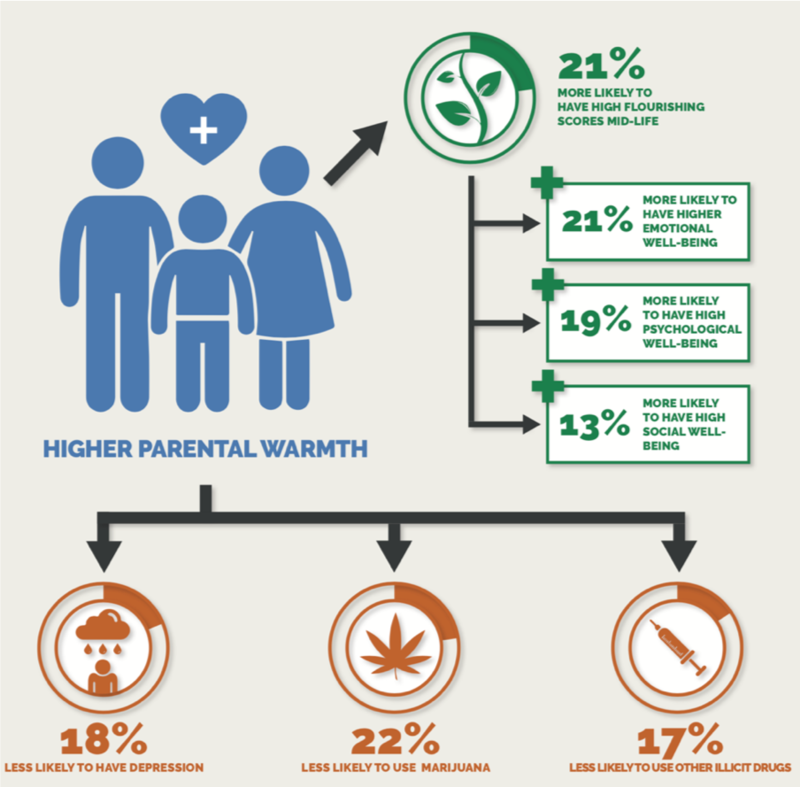FOR IMMEDIATE RELEASE 01/03/2019
New Harvard Study Finds That Parental Warmth in Childhood May Be Positive Factor for Flourishing Across Multiple Domains in Mid-Life
A new study from the Human Flourishing Program at Harvard University has found that one’s ability to flourish in midlife – a state in which all aspects of a person’s life are good – is closely linked to parental warmth in childhood. The findings are valuable for policy makers and public health officials, indicating that more focus on improved parenting in the home can have dramatic outcomes in the happiness and well-being of individuals in later life.
Cambridge, Massachusetts, United States of America - Janurary 3, 2019 – A happy childhood with loving parents can lead to a mid-life characterized by flourishing in multiple domains, a new study from the Human Flourishing Program at Harvard University’s Institute for Quantitative Social Sciences has found.
The study, Parental Warmth and Flourishing in Mid-Life, marks an important discovery in the study of human flourishing. The paper reveals that people’s first relationship – with their parents – has a robust and positive influence on their emotional, psychological, and social well-being well into mid-life.
While prior research on parental warmth has analyzed its influence on individual aspects of well-being, considered separately, the Harvard study’s new contribution to the literature is its holistic examination of parental warmth in relation to multiple measures of flourishing.
“Much of the past research on childhood antecedents of health has focused on identifying risk factors for illness such as parental neglect and parental abuse – in comparison, what positive factors may help promote health and well-being in later life is relatively understudied,” said lead author Ying Chen.
In this study, a moderate increase in parental warmth was linked to a variety of positive outcomes in mid-life (see the infographic, below), including 21% more likely to have higher level of flourishing. Likewise, it was associated with an 18% lower risk of depression and a 17% lower risk of illicit drug use.
|
It may start at home: A standard deviation increase in parental warmth has been found to contribute significantly to positive behavioral outcomes in later life, suggesting that improved parenting may lead to a child’s flourishing in mid-life. |
The findings suggest that implementing parenting programs as part of public health policy could lead to a net positive effect for population health and well-being, yet the progress to date on such initiatives remains relatively slow.
While parental warmth – or lack of it – can be one of the strongest influences on a young individual’s quality of life in adulthood, the authors believe that it is not the only one.Other important relationshipsearly in life can also impact an individual’s likelihood of flourishing in their mid-life. “For that reason, we believe it’s important to consider the impact of other experiences later in life such as friendships, marriage, education, and religious community that can alsoshapean individual’s behavioralpatterns,” added senior author Tyler VanderWeele.
The study’s conclusions mark an important step forward for the field, showing that parental warmth is linked to flourishing across multiple domains of well-being in mid-life, rather than just one.
Parental Warmth and Flourishing in Mid-Life,authored by Ying Chen, Laura Kubzansky, and Tyler VanderWeele, can be read in the January 2019 edition of Social Science and Medicine (Volume 220). For more information about the study and the Human Flourishing Program at Harvard University, please visit https://hfh.fas.harvard.edu/. For general and media inquiries, please contact Matthew Wilson at mfwilson@fas.harvard.edu.
About the Human Flourishing Program at Harvard University
Founded in 2016, the Human Flourishing Program at Harvard’s Institute for Quantitative Social Science aims to bring together knowledge from various academic fields on topics fundamental to human flourishingand to develop and implement systematic approaches to the synthesis of knowledge across disciplines. For more information, please visit the Human Flourishing Program’s website.

